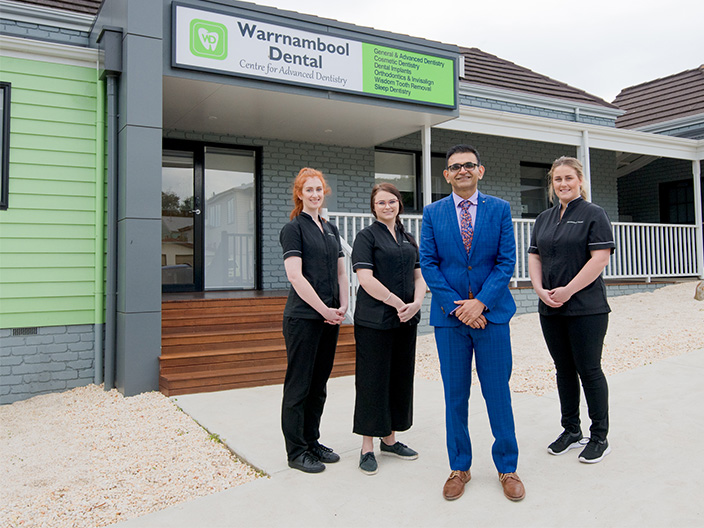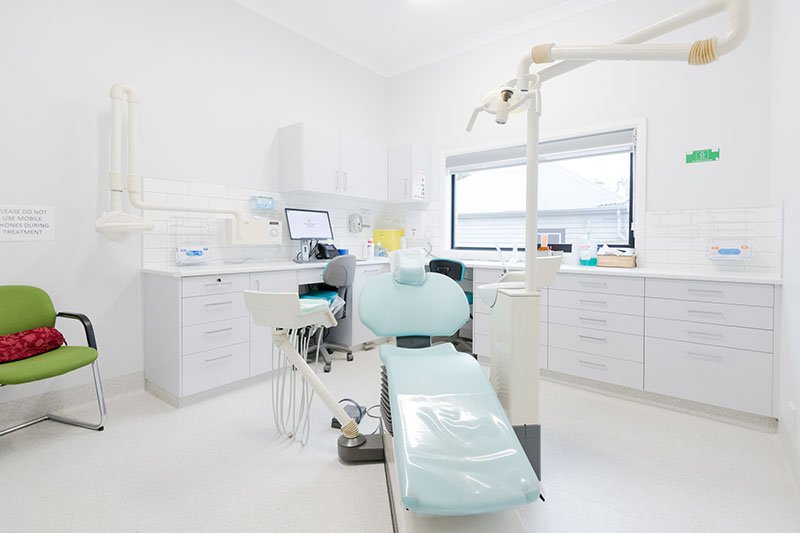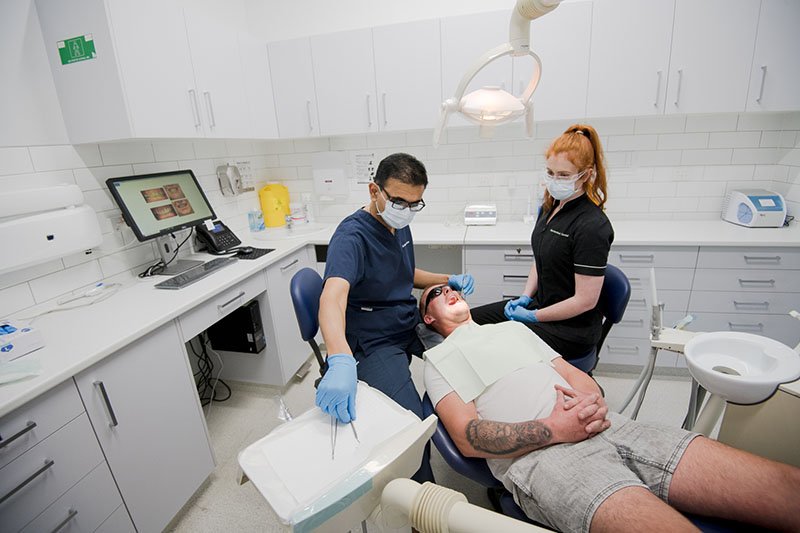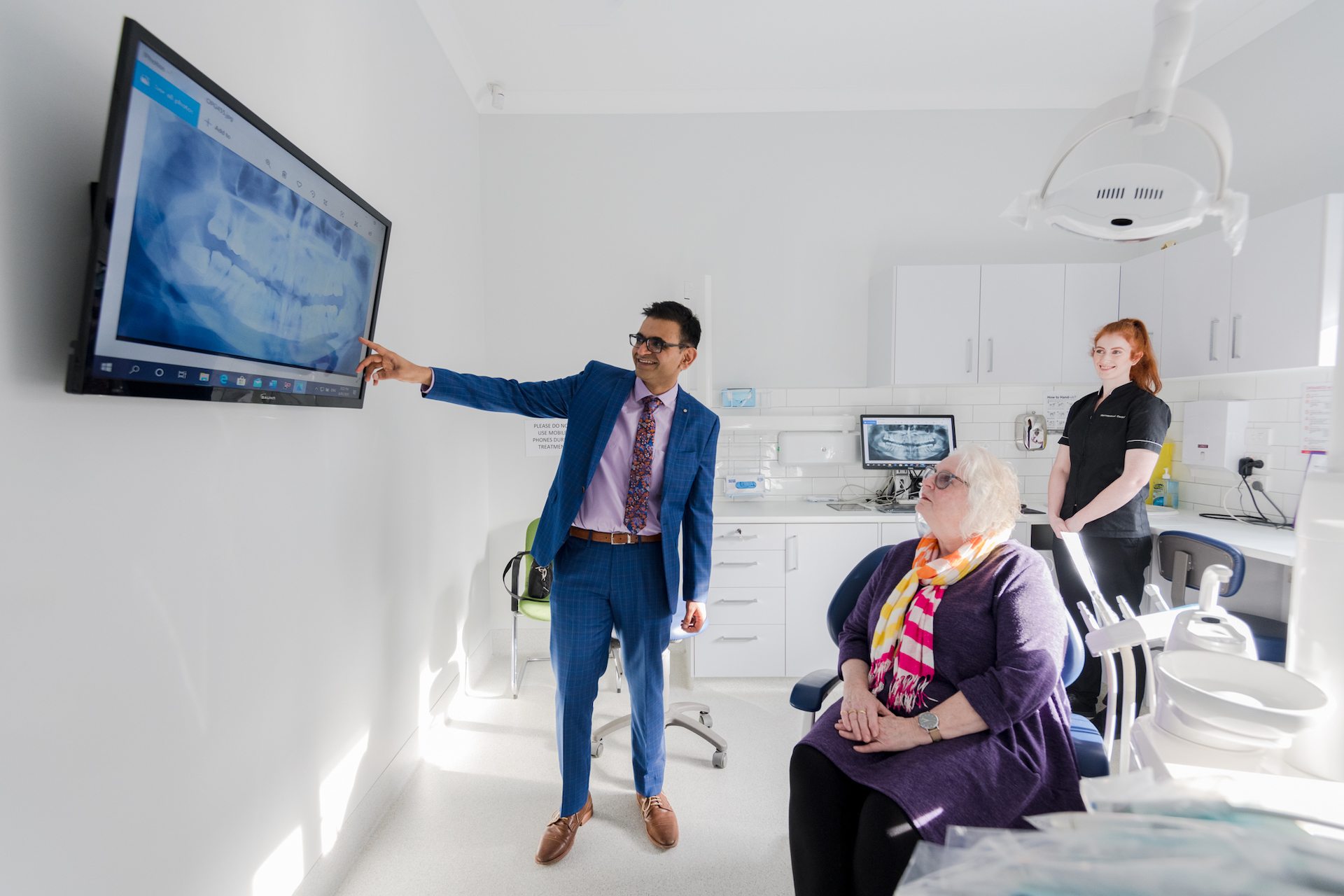Gum Disease Treatment
How to Know If You Have Gum Disease and What to Do About It
01
Immediate
Function
02
Healthier Teeth
and Gums
03
Expertise
Highly Experienced
04
Learn More
Gum Disease Treatment
Leading Dental Practice in Warrnambool
Warrnambool Dental is dedicated to helping you create the smile of your dreams with Gum Disease Treatments.
Excellence
Be sure that you will receive the best treatment & experience.
Be assured that our Warrnambool team shall provide you with The Right Choices.
We are committed to excellence in dental care & service.

5
Reasons to Choose Us
Dental Expertise
Dr Nishant Hurria
Advanced Technology
State-of-the-art Technology
Smile with Full Confidence!
Top-Rated Dentist
Creating the Best Experience
Find Out Why Our Clients Are Smiling
For Your Convenience
Easy Parking in CBD
Smile Now, Pay Later
Start Smiling Now!
Claim From Health Funds.
Easy Application & Setup at Practice.
Our Practice
Warrnambool Dental





“Quality is never an accident; it is the result of high intention, sincere effort, intelligent direction and skilful execution; it represents the wise choice of many alternatives.”

Gum Disease Treatment Warrnambool
Gum disease, or periodontitis, is a term used to describe inflammation of the gums and their accompanying symptoms.
Gum disease begins as an inflammation of the gums but can lead to the severe decay of gums, bone, and teeth during advanced stages.
It is caused by an overgrowth of plaque, which is a film of bacteria that grows on the teeth, gums, and tongue.
Gum disease can be prevented by good oral hygiene, which involves regular brushing, flossing, and removal of plaque.
When there is too much plaque around the gums, it can lead to inflammation of the gums, also known as gingivitis.
Stages of Gum Disease
Gingivitis
Gingivitis is the first stage of gum disease.
Symptoms of gingivitis include:
- Swollen gums
- Red or dark-coloured gums
- Tender or sensitive gums that hurt to touch
- Gums start bleeding during or after brushing or flossing
- Bad breath
Gingivitis is a non-destructive and completely reversible condition.
During this stage of gum disease, periodontal treatment and good oral hygiene are essential to reversing the condition.
If left untreated, gingivitis can lead to periodontitis.


Periodontitis
If gingivitis is allowed to persist, it can ultimately lead to a destructive form of gum disease called periodontitis.
When gum disease reaches this stage, it can cause the decay of gum tissue and bone which hold teeth in place.
Periodontitis should be treated quickly and effectively to prevent extensive dental damage.
Periodontal treatment and the practice of proper oral hygiene is usually enough to stop further decay.
If left untreated, bacterial growth inside of the gums and around tooth structure will cause irreversible bone loss around the roots of teeth.
With advanced periodontitis, roots become exposed, and teeth are no longer properly supported by their surrounding structure.
At this stage, teeth become loose, and the patient may require tooth extraction if treatment is no longer possible.
Signs of Gum Disease
Contact your Warrnambool dentist for an examination if you notice these symptoms:
- Inflamed, swollen, or tender gums
- Noticeable bleeding when brushing or flossing
- Receding gum line around teeth, causing teeth to appear longer
- Exposed gum pockets between teeth and gums
- Teeth not fitting together properly when biting
- Tooth movement
- Discharge or pus around teeth
- Bad breath that cannot be treated
Treating Gum Disease
If caught in its early stages, gum disease can be treated by removing and preventing plaque build-ups that cause inflammation.
With a simple visit to the dental clinic, your dentist will be able to remove any hardened plaque (tartar) through quick and painless teeth cleaning procedure.

If there is tartar around your teeth, you will not be able to remove it with brushing or flossing alone and will have to see your dentist.
After your gum lines have been cleaned and the tartar removed, you can prevent further build-up through regular and healthy oral hygiene.
When gum disease has progressed to the point of damage, surgery may be required to prevent further decay.
Your dentist will be able to determine the extent of your condition and advise you on the proper course of action in case your gum disease is progressive.
Even during advanced stages, it may not be too late to save the teeth and stop further deterioration.
Regular visits to the dentist are the best way to catch gum disease early and prevent harmful symptoms and tooth loss.
Healthy Gums
Healthy gums are dense and strong. They don’t hurt to the touch, are not swollen, do not bleed, and fit tightly around the teeth.
Gingivitis
Gums with gingivitis may look swollen, red, or inflamed. They can hurt, be sensitive to the touch, and bleed noticeably when brushed or flossed.
Periodontitis
Receding gum lines become noticeable, with teeth appearing longer or showing roots. Pockets between teeth and gums are formed. Teeth may become loose.
You Matter to Us.
Healthy gums are dense and strong. They don’t hurt to the touch, are not swollen, do not bleed, and fit tightly around the teeth.
Come and visit your Warrnambool dentist today and find out what we can do together to fight gum diseases.
We are here to help you answer these & more questions thoroughly
Call Warrnambool Dental.
A smile can open doors and change lives.
(03) 5562 4433

Ask About Sleep Dentistry
For patients who feel anxious about dental treatment, have a sensitive gag reflex, or require complex procedures, Sleep Dentistry offers a calming alternative. Also known as sedation dentistry, this approach allows you to undergo treatment in a deeply relaxed state—while remaining responsive and safe.
Our experienced team can offer IV sedation, oral sedation, or happy gas to ensure your comfort. Let us know before your next appointment and we can assist.
Frequently Asked Questions
About Gum Disease Treatments
How common is gum disease?
Very. That’s why it is so important to prevent gum disease before it becomes serious.
Can children develop gum disease?
Gum disease is rarely found in children, and not often found in adolescents. However, children should still learn the importance of keeping their teeth and gums healthy to prevent gum disease in the future.
What can I do at home to prevent gum disease?
Take good care of your teeth and gums. This includes brushing your teeth at least twice a day, flossing at least once each day, and seeing your dentist for routine check-ups twice a year.
What are the early signs of gum disease?
Early symptoms involve inflamed and reddened gums, gum tenderness, gum bleeding while brushing or flossing, and breath halitosis.
Can gum disease be reversed?
In its early stage (gingivitis), gum disease can be reversed with proper periodontal treatment and good oral hygiene. However, advanced stages like periodontitis may require more extensive treatments.
What happens if you don't treat gum disease?
Not-treated gum disease may result in periodontitis, bone and gum tissue loss, loose teeth, and tooth loss.
How is gum disease treated?
Some measures usually taken include scaling and root planning, re-instruction in oral hygiene measures, and, in extreme cases, plaque surgery may be done to stop further deterioration.
Can gum disease cause other health problems?
Yes, periodontal diseases, particularly periodontitis, have been associated with various general health diseases like heart disease, diabetes, and respiratory diseases.
How often should I visit my dentist to prevent gum disease?
It is recommended that you visit your Warrnambool dentist at least twice a year. This will help in early disease detection and treatment of healthy gums.
ABOUT THE AUTHOR

Dr Nishant Hurria
Dr Nishant Hurria is an Australian-based health professional and the principal dentist of Warrnambool Dental with a special interest in Crowns & Bridges and Dental Implants.
